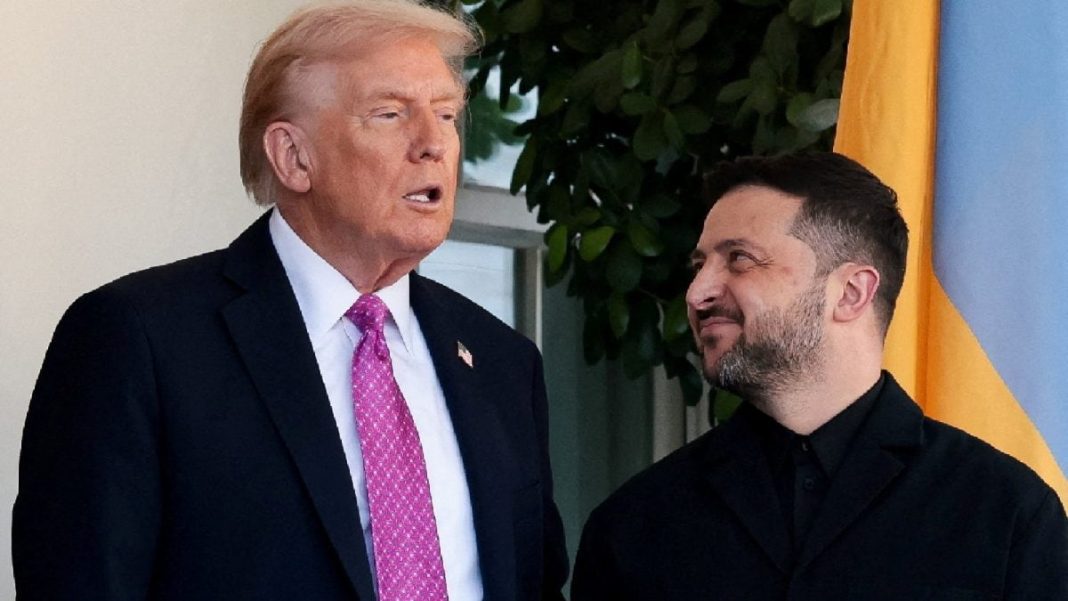Former US President Donald Trump has once again ignited a significant debate with his recent remarks blaming Ukrainian President Volodymyr Zelenskyy for the ongoing conflict with Russia. Speaking at a campaign rally, Trump controversially claimed that Ukraine had shown “zero gratitude” for the substantial aid received from the United States, suggesting that Zelenskyy’s approach was a contributing factor to the war. This narrative, echoing sentiments Trump has expressed previously, reignites questions about the nature of international assistance and the intricacies of wartime diplomacy, particularly as the global community, including India, closely monitors the geopolitical fallout.
Trump’s Recurring Grievance: The “Zero Gratitude” Accusation
Donald Trump’s latest critique centres on his perception of Ukraine’s appreciation for American support. He argued that despite receiving billions of dollars in military and financial aid, President Zelenskyy has consistently demanded more without adequately acknowledging past contributions. This perspective is not new; throughout his presidency and since, Trump has often framed international relationships through the lens of transactional exchanges, emphasizing what he sees as a lack of reciprocity from recipient nations.
His recent statements suggest that this perceived ingratitude somehow emboldened Russia or complicated efforts to de-escalate the conflict. For an Indian audience accustomed to the nuances of international relations, where aid often comes with implicit or explicit expectations, this argument might resonate with certain domestic perspectives on foreign policy and resource allocation. However, it also clashes with the broader understanding that aid to Ukraine is often seen as a strategic investment in global stability and a stand against territorial aggression, rather than mere charity.
Geopolitical Ripples: Impact on International Support and Perception
Trump’s comments carry significant weight, especially given his potential return to the White House. Such rhetoric can have profound implications for the future of US foreign policy and the unity of Western alliances. If a future Trump administration were to adopt this “zero gratitude” stance officially, it could drastically alter the flow of aid to Ukraine, potentially weakening its defence capabilities and prolonging the conflict.
Moreover, these statements complicate the delicate balance of international diplomacy. Nations like India, which have carefully navigated relations with both the US and Russia, watch such developments closely. India’s own foreign policy emphasizes strategic autonomy and a multi-aligned approach, making it sensitive to rhetoric that could destabilize global power dynamics. Trump’s critique could be interpreted in various ways: as a call for greater accountability, or as a divisive statement that undermines collective efforts to uphold international law. It adds another layer of complexity to the ongoing debate about the efficacy and rationale behind global aid packages.
Echoing his past remarks, Mr. Trump reportedly stated, “Ukraine showed zero gratitude, and frankly, President Zelenskyy is a master at getting people to give him money, and he’s not very good at saying thank you.”
Beyond Gratitude: The Strategic Imperatives of Aid
While Trump focuses on gratitude, the provision of aid to Ukraine by the United States and its allies is rooted in broader strategic imperatives. These include deterring further Russian aggression, upholding the principles of national sovereignty and territorial integrity, and safeguarding democratic values in Europe. Many policymakers argue that supporting Ukraine is not merely about altruism but about protecting a rules-based international order that benefits all nations, including those like India, which rely on stable global trade and security frameworks.
President Zelenskyy, in his role as a wartime leader, has consistently articulated Ukraine’s need for continued support as a matter of survival against an aggressor. His appeals are often framed within the context of Ukraine fighting for values that are shared by the democratic world. The debate over gratitude, therefore, often overshadows the complex geopolitical calculations and moral arguments underpinning the aid efforts.
Donald Trump’s repeated insistence on Ukraine’s perceived ingratitude adds a contentious dimension to the ongoing international discourse surrounding the war. These remarks challenge conventional diplomatic norms and force a re-evaluation of the motivations behind and the expectations from international assistance. As the conflict continues, and as global powers recalibrate their positions, the narrative shaped by such high-profile statements will undoubtedly influence public opinion and policy decisions worldwide, impacting not just Ukraine, but the broader geopolitical landscape that nations like India carefully navigate.




